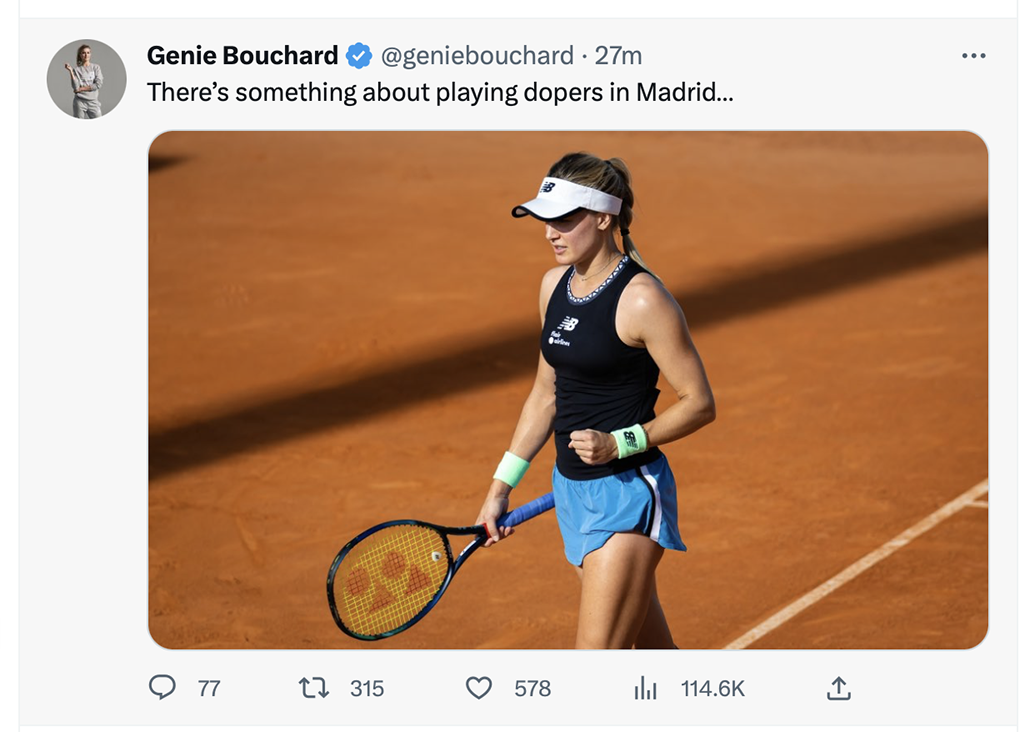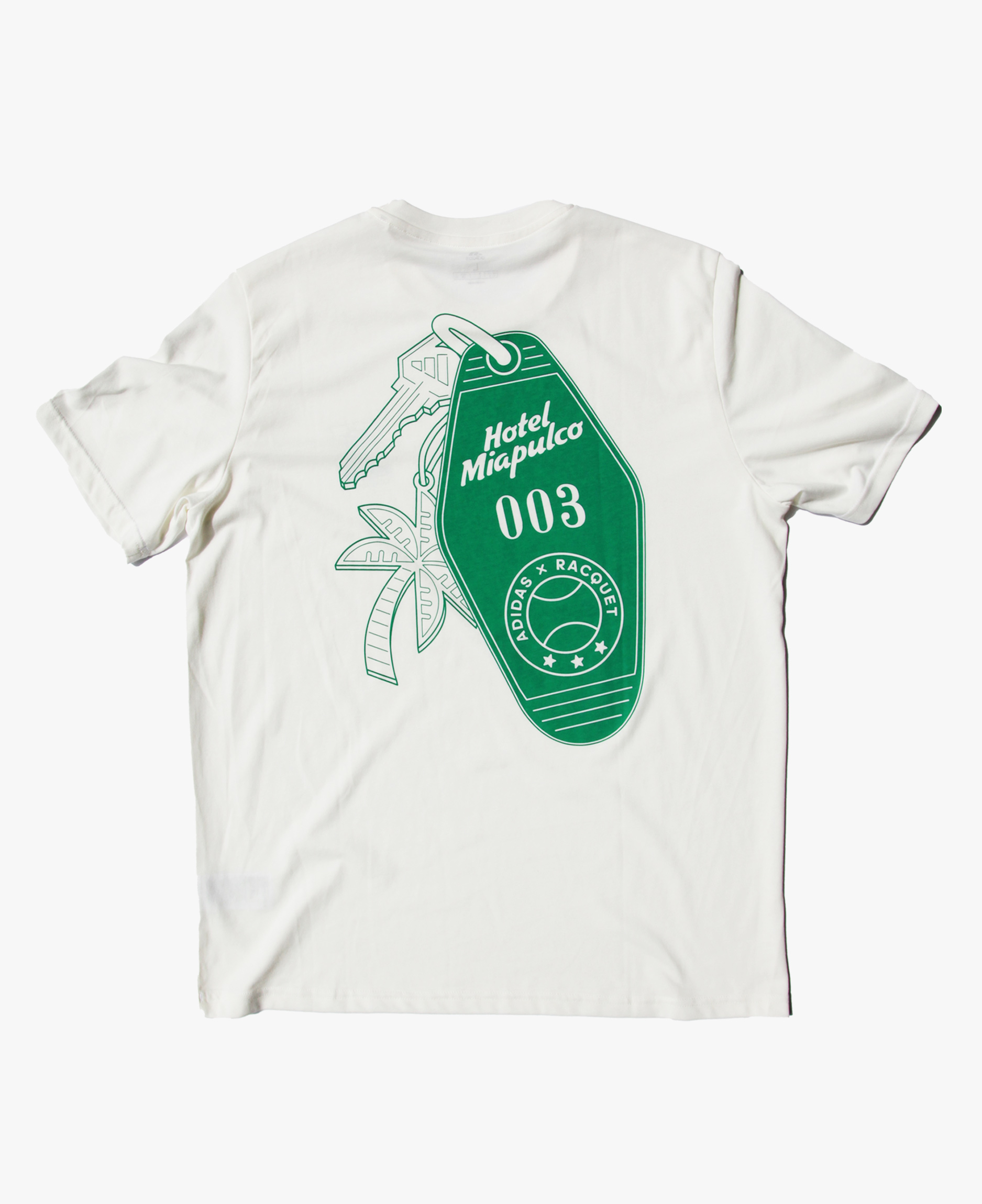By Giri Nathan
The payoff is spicy, but you’ll have to stick with us.
Madrid, 2017, Eugenie Bouchard versus Maria Sharapova. Both players had just come off challenging three-setters, and this one also went three, before Bouchard won 7–5, 2–6, 6–4. It would be Bouchard’s only career victory against her childhood idol in five tries. And it was the last attempt she’d get, because in 2020 Sharapova wound down what will almost certainly be a Hall of Fame career, give or take a little hand-wringing. “I definitely had some extra motivation going into today,” Bouchard said after her victory.
What was she talking about? And why are we thinking today of this otherwise unremarkable match between a candy empress and a player who has not tasted the top 100 in four years? The answers are connected. Bouchard was perhaps Sharapova’s most outspoken hater in the office, after the five-time major champ tested positive for meldonium, a heart medication that boosts blood flow. The World Anti-Doping Agency had added the drug to its banned-substances list in 2016; Sharapova tested positive for it at the Australian Open that year. Later she said that she’d missed notices about its impending ban because they were “buried in newsletters, websites, or handouts,” and that she’d been using meldonium steadily throughout the previous decade due to a family history of diabetes and heart issues. The excuse was about as limp as the handshake Bouchard and Sharapova shared after that match in Madrid.
More specifically, at the time of said handshake, Sharapova had just returned from her suspension—shortened from an initial two-year sentence—and accepted the second of several wild cards laid out for her like a welcome mat. Bouchard was irked by the relaxed sentence, the wild cards, and the offense itself. “She is a cheater and so, to me, I don’t think a cheater in any sport should be allowed to play that sport again. It’s so unfair to all the other players who do it the right way,” she told a Turkish broadcaster for TRT World. “I think from the WTA it sends the wrong message to young kids: Cheat and we’ll welcome you back with open arms. I don’t think that’s right, and definitely not someone I can say I look up to anymore.”
Thus the “extra motivation” for winning that second-round match. Possibly Bouchard could have used a thimble or two of that extra motivation in the six years since. It has been a rough stretch for the one-time Wimbledon finalist. Partly this has to do with the 2021 shoulder surgery that took Bouchard out for 17 months; she returned to the tour with no ranking points. But this week was an unexpected coup. She returned to the main draw at Madrid for the first time since that 2017 run, which passed through Sharapova and ended in the quarterfinal. Using a protected ranking, Bouchard, who is somehow still only 29 years old, entered the qualifying rounds this week and made it into the main draw. In the first round, she would play fellow qualifier Dayana Yastremska. In case you thought we’d be spending the rest of this newsletter on Eugenie Bouchard match recaps, rest assured, this is where the beef returns.
Back in November 2020, Yastremska tested positive for mesterolone, an anabolic steroid used to treat male infertility. She was provisionally suspended in January 2021, denied on her first appeal, and cleared on her second. The International Tennis Federation said it “accepted Ms. Yastremska’s account of how the mesterolone entered her system and determined that she bore no fault or negligence for the violation.” If you are really bored and enjoy suspiciously redacted documents, rifle through the official ruling, where Yastremska’s defense is described as “contamination caused by her boyfriend.”
Yastremska resumed competition in July 2021. The 22-year-old has developed a reputation for bad-faith medical timeouts and late-stage retirements, but nothing new with respect to doping. Apparently Yastremska was cleared in the eyes of the ITF, but not in the discerning eyes of Eugenie Bouchard, because after winning their bout in Madrid on Thursday, 6–7(6), 6–2, 6–2, Bouchard posted this magnificent, since-deleted tweet. It was a picture of her on court with a caption about her history there: “There’s something about playing dopers in Madrid…”

This was Bouchard’s immediate instinct after achieving her biggest on-court result in several years, which shot her back up to No. 226 in the live WTA rankings. Confidence works in mysterious ways. And that is why a six-year-old feud with Maria Sharapova is back in the tennis zeitgeist. I can only stand and applaud this bafflingly deep commitment to the beef lifestyle. On Friday, Bouchard lost her second-round match to world No. 20 Martina Trevisan, 6-2, 7-5.
Above: Genie Bouchard gives Maria Sharapova the ice grill at the 2017 Mutua Madrid Open. (Getty)



